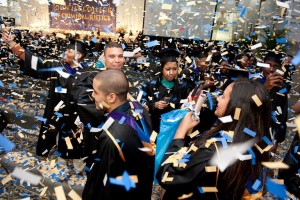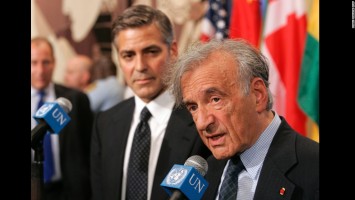No Dark Sarcasm in the Classroom
The views expressed are those of the author and do not necessarily reflect the views of ASPA as an organization.
By Jason Bowns
June 2, 2017
It’s commencement season. Time is moving on, and across America, students are moving up and on. Whether it’s high school, junior high or kindergarten, ceremonies represent this change. What lessons will those moments bring, and what is left behind? What is the truest measure of an education? Was it just about thought control? Were they really all just bricks in the wall?
Let me speak for a moment about my experience at John Jay College of Criminal Justice. Four years after my own graduation, the lessons still stand firm like rocks abutting the probative questions we inevitably face every day. Their substance has not eroded. I was searching for something when I went there; I tried to find a place that matched my worldview and goals.’

Its namesake stresses the criminal justice focus. It’s a certified New York City Police Academy. I enrolled in what was the only “Inspector General track” of study in this country, within the Public Management Department. My professors were retired FBI agents, city managers, policy advisors and legislators. One professor led a special inquiry into the 1986 Challenger explosion. Another authored the New York Organized Crime Control Act. The college president was a former Deputy Commissioner of the New York City Police Department among other roles
There, I discovered a landscape which encouraged dialogues about what exactly justice meant for whom. We heard stories about ethical dilemmas which professors had faced during their own varied careers. We read books, some of which they’d written. We studied current events. We shared ideas and found a way to see the other point of view, even if it was different.
There were times when we all agreed on things, but sometimes we just agreed to disagree. Some professors were better in my eyes than others. The greatest ones nurtured rather than confined; they did not control thoughts but instead sought to spur our thinking. There was no dark sarcasm in the classroom. In that building space, we began as teachers and students. In the end, on that last commencement day, we were all colleagues. We grew up instead of down.
One course professor, also serving as executive director of the Association of Inspectors General (AIG), boldly framed the war against corruption as an unending fight between good and evil.
While discussing whether outsourcing is always the answer, another professor abruptly declared the useful adage, “Learn the rules, play by the rules, and win by the rules.”
The education did not stop when class ended. Beyond the lecture halls flourished a campus community rich with provocative events on any given day.
The AIG hosted Neil Barofsky, first Special Inspector General of the Troubled Asset Relief program. His 2012 book Bailout described what he learned from that experience.
I was able to ask the Greek Minister of Public Order how he could secure the borders of a country with so many islands. That happened as some protesters had also peacefully assembled to shout about their concerns.
On a different day, I heard Noam Chomsky talk about Vietnam. Our human resources professor also hosted former mayoral cabinet officials who spoke about exercising good judgement. We heard about the virtue of doing that rather than only telling bosses what they want to hear.
John Jay hosted the first debate between mayoral candidates in 2013. I watched former Controller Bill Thompson, City Council Speaker Christine Quinn, Councilman Bill DeBlasio, and others speak about public safety.
After graduating on May 28, 2013, I kept in touch. I returned to John Jay a year later for the ceremony honoring Holocaust survivor Elie Wiesel. I’d read Night, watched videos of Wiesel’s plea for President Reagan to avoid a German cemetery which contained Nazi soldiers’ graves.

Suddenly, there he was only a few seats away, smiling and greeting friends. Famed opera singer Jessye Norman released some divine melodies for our ears to receive. Dramatic actors James Earl Jones and Sir Patrick Stewart read aloud in their bold voices.
Wiesel spoke about how hard he’d worked for Night to be read by anyone. Dozens of publishers rejected him. Finally, a small publishing house offered a limited print run. His anecdote struck me not only because he’d outlived such horror. He also found a way for his story to survive.
Wiesel died last year. I’ll always have that memory of what he taught us about holding onto a vision, how we must persist. If we do that, then we shall endure. Even time can’t take it away.
Mark Twain noted, “Training is everything. The peach was once a bitter almond; the cauliflower is nothing but cabbage with a college education.” That principle equally applies whether a growth experience blooms on a college campus, at home, in some busy city, when meeting with foresters on a remote farm, or even while on the job.
During this commencement season, we should all remember the lessons and messages of our own lives. These are some of mine. Now, what are yours?
Author: Reared in rural Connecticut, Jason Bowns earned a Bachelor of Arts degree from New York University, majoring in Classical Civilization and Hellenic Studies while minoring in Politics and Social Studies Education. He earned his Master of Public Administration degree at John Jay College of Criminal Justice, honing essential skills to detect organizational fraud, waste, and abuse. He’s reachable at [email protected].




 (1 votes, average: 5.00 out of 5)
(1 votes, average: 5.00 out of 5)
 Loading...
Loading...
No Dark Sarcasm in the Classroom
The views expressed are those of the author and do not necessarily reflect the views of ASPA as an organization.
By Jason Bowns
June 2, 2017
It’s commencement season. Time is moving on, and across America, students are moving up and on. Whether it’s high school, junior high or kindergarten, ceremonies represent this change. What lessons will those moments bring, and what is left behind? What is the truest measure of an education? Was it just about thought control? Were they really all just bricks in the wall?
Let me speak for a moment about my experience at John Jay College of Criminal Justice. Four years after my own graduation, the lessons still stand firm like rocks abutting the probative questions we inevitably face every day. Their substance has not eroded. I was searching for something when I went there; I tried to find a place that matched my worldview and goals.’
Its namesake stresses the criminal justice focus. It’s a certified New York City Police Academy. I enrolled in what was the only “Inspector General track” of study in this country, within the Public Management Department. My professors were retired FBI agents, city managers, policy advisors and legislators. One professor led a special inquiry into the 1986 Challenger explosion. Another authored the New York Organized Crime Control Act. The college president was a former Deputy Commissioner of the New York City Police Department among other roles
There, I discovered a landscape which encouraged dialogues about what exactly justice meant for whom. We heard stories about ethical dilemmas which professors had faced during their own varied careers. We read books, some of which they’d written. We studied current events. We shared ideas and found a way to see the other point of view, even if it was different.
There were times when we all agreed on things, but sometimes we just agreed to disagree. Some professors were better in my eyes than others. The greatest ones nurtured rather than confined; they did not control thoughts but instead sought to spur our thinking. There was no dark sarcasm in the classroom. In that building space, we began as teachers and students. In the end, on that last commencement day, we were all colleagues. We grew up instead of down.
One course professor, also serving as executive director of the Association of Inspectors General (AIG), boldly framed the war against corruption as an unending fight between good and evil.
While discussing whether outsourcing is always the answer, another professor abruptly declared the useful adage, “Learn the rules, play by the rules, and win by the rules.”
The education did not stop when class ended. Beyond the lecture halls flourished a campus community rich with provocative events on any given day.
The AIG hosted Neil Barofsky, first Special Inspector General of the Troubled Asset Relief program. His 2012 book Bailout described what he learned from that experience.
I was able to ask the Greek Minister of Public Order how he could secure the borders of a country with so many islands. That happened as some protesters had also peacefully assembled to shout about their concerns.
On a different day, I heard Noam Chomsky talk about Vietnam. Our human resources professor also hosted former mayoral cabinet officials who spoke about exercising good judgement. We heard about the virtue of doing that rather than only telling bosses what they want to hear.
John Jay hosted the first debate between mayoral candidates in 2013. I watched former Controller Bill Thompson, City Council Speaker Christine Quinn, Councilman Bill DeBlasio, and others speak about public safety.
After graduating on May 28, 2013, I kept in touch. I returned to John Jay a year later for the ceremony honoring Holocaust survivor Elie Wiesel. I’d read Night, watched videos of Wiesel’s plea for President Reagan to avoid a German cemetery which contained Nazi soldiers’ graves.
Suddenly, there he was only a few seats away, smiling and greeting friends. Famed opera singer Jessye Norman released some divine melodies for our ears to receive. Dramatic actors James Earl Jones and Sir Patrick Stewart read aloud in their bold voices.
Wiesel spoke about how hard he’d worked for Night to be read by anyone. Dozens of publishers rejected him. Finally, a small publishing house offered a limited print run. His anecdote struck me not only because he’d outlived such horror. He also found a way for his story to survive.
Wiesel died last year. I’ll always have that memory of what he taught us about holding onto a vision, how we must persist. If we do that, then we shall endure. Even time can’t take it away.
Mark Twain noted, “Training is everything. The peach was once a bitter almond; the cauliflower is nothing but cabbage with a college education.” That principle equally applies whether a growth experience blooms on a college campus, at home, in some busy city, when meeting with foresters on a remote farm, or even while on the job.
During this commencement season, we should all remember the lessons and messages of our own lives. These are some of mine. Now, what are yours?
Author: Reared in rural Connecticut, Jason Bowns earned a Bachelor of Arts degree from New York University, majoring in Classical Civilization and Hellenic Studies while minoring in Politics and Social Studies Education. He earned his Master of Public Administration degree at John Jay College of Criminal Justice, honing essential skills to detect organizational fraud, waste, and abuse. He’s reachable at [email protected].
Follow Us!